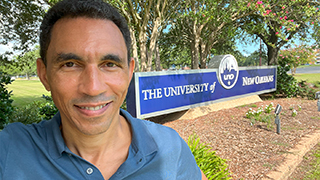
Richard Winchester, J.D., professor of law at Seton Hall University Law School
Richard Winchester, J.D., professor of law at Seton Hall University Law School and a national authority on small business and federal employment tax policy, is spending the summer as a visiting scholar in the Urban Studies Department at the University of New Orleans. While there, he will be conducting archival research and other work in connection with a book he is writing on the New Orleans community of Pontchartrain Park.
Unique among American neighborhoods, Pontchartrain Park was the largest Black community whose construction was financed by the Federal Housing Administration (FHA) during the 1950s at a time when the agency had limited its programs to whites, notes Winchester. The community was adjacent to an all-white subdivision that was constructed by the same builder. Even though the builder offered the same prefabricated homes in each community, the prices for the ones in Pontchartrain Park were substantially higher. Winchester is trying to understand why this occurred.
"I am asking questions that other scholars have not considered. My expertise in business and tax law enables me to understand the economics driving the joint venture that was formed to build this community," said Winchester, adding "For instance, I'm finding that the company's costs were higher than those for its all-white neighbor. But that doesn’t explain everything. There were multiple investors who partnered with the builder for Pontchartrain Park. They adopted a capital structure that put pressure on the company to generate elevated returns for the shareholders. In addition, because virtually no one else was building homes for Blacks, the company was in a position to operate without having to worry about meeting or beating the price that competitors might have offered. All of this impacted how much Black buyers had to pay and their capacity to build wealth at the same rate as their white counterparts."
A native of New Orleans himself, Winchester had many friends and high school classmates who lived in Pontchartrain Park. However, he was not aware of this aspect of the neighborhood's history until his scholarly interests expanded beyond his core expertise of tax policy. He began studying the role of homeownership in generating intergenerational wealth. That is when he learned about the FHA and the role it played in preventing most Blacks from becoming homeowners. Interestingly, the agency made a few exceptions, with Pontchartrain Park being the most noteworthy.
Winchester's objective is to write a book that will be of interest to scholars and non-scholars alike. The University of New Orleans (UNO) is uniquely positioned to support him in this endeavor, he explained. Most obviously, the institution is physically located in the city where he will find records that are central to his work. At the same time, Winchester's project and his expertise in law will add a new dimension to UNO's Urban Studies Department, which already has the strongest reputation in the region and the only master’s program in Louisiana.
His work and expertise in the tax field have earned Winchester admission to the National Academy of Social Insurance and the American College of Tax Counsel. Before entering legal education, Professor Winchester spent ten years as a corporate tax planner, helping privately owned and publicly traded companies structure their business operations and financial transactions. He ended his time in practice as an international tax attorney in the national tax office of PWC, where he advised both U.S. firms investing abroad and foreign firms investing in the U.S.
Winchester began his legal career as a law clerk for Chief Justice Robert N.C. Nix, Jr. of the Pennsylvania Supreme Court. He is a graduate of Yale Law School, where he was editor-in-chief of the Yale Law & Policy Review. He holds a B.A. from Princeton University in its School of Public and International Affairs.
For more information, please contact Seton Hall Law School.
For more information, please contact:
Laurie Pine
(973) 902-8060
[email protected]







